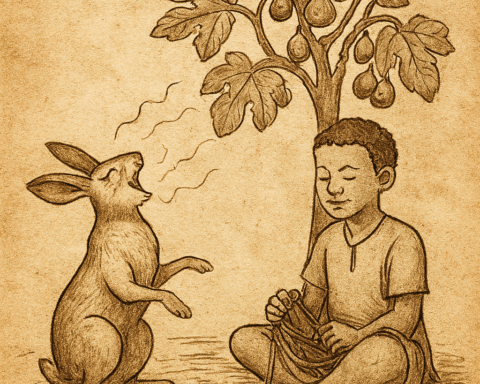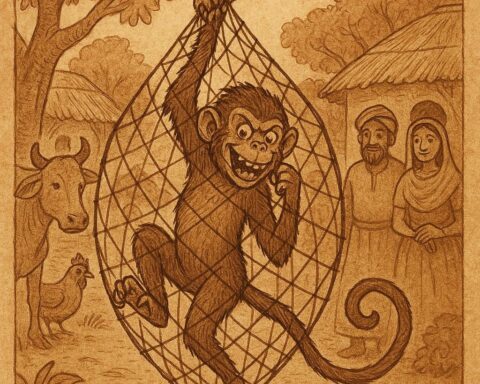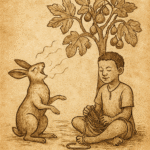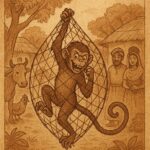Kweku Anansi, the trickster spider of Ashanti tales, was well known for his cunning ways. He and his son, Kweku Tsin, were both skilled farmers who usually enjoyed plentiful harvests. Their farms had always been fruitful, with yams, beans, and maize ripening under their care. But one year misfortune struck. They had sown their seeds as usual, waiting for the rains to come. Yet day after day, the sky remained hard and blue, and no rain fell for more than a month. The soil cracked and crumbled into dust, and the seeds lay hidden beneath the earth, dry and lifeless.
One afternoon, as Kweku Tsin walked sorrowfully through his barren fields, his heart sank. He thought of his family and their empty storehouses. How would they live if nothing grew this season? As he paced the dry ridges, he noticed something unusual, a tiny dwarf sitting calmly by the roadside. The little figure was no ordinary man, but a hunchback dwarf whose presence seemed both strange and powerful.
The dwarf looked at Kweku Tsin’s troubled face and asked, “Why do you look so sad, young farmer?”
Kweku Tsin, honest as ever, answered truthfully. “The rains have not come. My fields are dry, and my crops will not grow. I fear my family will have no food.”
The dwarf nodded slowly and said, “I will help you. Bring me two small sticks. With them you must tap me gently on my hump while I sing.”
Though surprised, Kweku did as instructed. He fetched two slender sticks and waited. The dwarf began to sing in a soft, rhythmic chant:
“O water, go up, O water, go up,
And let rain fall, and let rain fall.”
As soon as Kweku tapped the dwarf’s hump, clouds gathered above, and raindrops began to fall. The rain poured steadily until the soil was dark, rich, and ready. The seeds drank eagerly, and within days, sprouts pushed through the ground. Kweku’s crops flourished, green and strong.
News of Kweku’s thriving fields soon reached Anansi, whose own farm remained dry and lifeless. Envious and greedy, he hurried to his son, demanding to know the secret. True to his nature, Kweku Tsin told the truth, recounting exactly what the dwarf had done.
Anansi, however, was not content to follow instructions faithfully. He thought to himself, My son used two small sticks. But I am wiser. I shall use big, strong sticks. If the dwarf can bring rain with a little effort, then surely he can be forced to do even more with greater strength.
So Anansi set off toward his farm. On the way, he cut two thick, heavy branches, hiding them carefully when he spotted the dwarf. As before, the hunchback greeted him and asked the reason for his sorrow.
“My crops will not grow for lack of rain,” Anansi replied, feigning misery.
“Then fetch two small sticks,” the dwarf instructed kindly, “and tap me gently on my hump. I will bring the rain for you.”
But instead of small sticks, Anansi brought out his heavy branches. With all his might he struck the dwarf. He struck once, twice, again and again, so hard that the poor dwarf fell to the ground lifeless.
Anansi froze in terror. The dwarf was not just any wanderer; he was the king’s jester, beloved by the entire court. Anansi knew the king would demand punishment for his death. Trembling with fear, he devised a plan to place the blame on someone else.
He dragged the dwarf’s body to a tall kola tree, laid it carefully on the top branches, and sat beneath the tree as though waiting patiently. Before long, Kweku Tsin arrived, curious to see if his father had succeeded.
“Father,” he asked, “have you not seen the dwarf?”
“Oh yes,” Anansi lied smoothly. “He climbed this tree to pluck kola nuts. I am waiting for him to come down.”
“I will fetch him,” offered Kweku Tsin, and he began climbing. But as soon as his head touched the body, the corpse toppled to the ground.
Anansi sprang up, feigning outrage. “You wicked boy! You have killed the king’s jester!”
But Kweku, wise to his father’s tricks, calmly replied, “Do not worry. The king was displeased with the jester and promised a bag of gold to whoever killed him. I will claim the reward.”
“No, no!” shouted Anansi, suddenly eager. “The reward is mine! I killed him with two big sticks. I will take him to the king!”
Kweku merely shrugged. “As you say, Father. Since you killed him, you may carry him.”
So Anansi marched to the palace, carrying the body proudly, dreaming of gold. But when he arrived, the king’s face darkened with fury. His beloved jester had been slain, and there would be no reward. Instead, Anansi was condemned.
The king ordered the body placed inside a great box, enchanted so it could never be set down. Anansi was forced to carry the heavy burden upon his head forever, unless he could trick someone else into taking it from him.
For many days Anansi staggered beneath the weight, his legs trembling, his back aching. Then one day, exhausted, he encountered Mr. Ant.
“Good friend,” said Anansi sweetly, “will you hold this box for me while I run to the market? I only need to buy a few things. I will return quickly.”
Mr. Ant frowned. “I know your tricks, Anansi. You want me to take your burden.”
“Oh, no,” Anansi protested, feigning innocence. “I promise I will return.”
Because Ant was an honest creature who always kept his word, he believed Anansi’s promise. He lifted the box onto his head, steadying it carefully. But Anansi never returned. From that day onward, Ant was condemned to carry heavy loads upon his back, a burden passed down through his kind. And that is why, even now, we see ants hurrying across the earth with bundles far larger than themselves.
Moral of the Story
Greed and dishonesty only lead to suffering. Anansi, in his selfishness, tried to twist good fortune for his own gain, but in the end, he escaped his burden only by placing it on another. The tale teaches us that deceit may bring temporary relief, but true wisdom lies in honesty and fairness.
Knowledge Check
1. Who were the main characters in this folktale?
The story features Kweku Anansi, his son Kweku Tsin, a magical dwarf, the king, and Mr. Ant.
2. What was the role of the dwarf in the story?
The dwarf, the king’s jester, had the power to bring rain when lightly tapped on the hump with two small sticks.
3. Why did Anansi kill the dwarf?
Anansi, greedy and impatient, used heavy sticks instead of small ones, striking the dwarf too hard and killing him.
4. What punishment did the king give Anansi?
The king enchanted a box containing the dwarf’s body, forcing Anansi to carry it forever unless someone else accepted it.
5. How did the ants inherit their burden?
Mr. Ant, deceived by Anansi’s false promise, took the enchanted box and has carried heavy loads ever since.
6. What is the main lesson of this folktale?
The story warns against greed, dishonesty, and selfishness, showing that trickery ultimately backfires.
Source: Ghanaian Folktale






